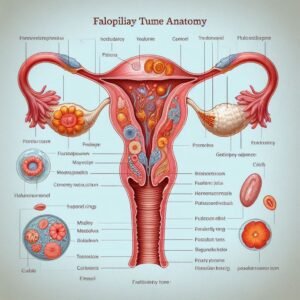Table of Contents
ToggleIntroduction
Blocked fallopian tubes are one of the most common causes of female infertility, accounting for approximately 25-30% of cases. This condition prevents sperm from reaching the egg, thereby obstructing fertilization. Common causes include pelvic inflammatory diseases (PID), endometriosis, prior abdominal surgeries, infections, or post-ectopic pregnancy adhesions. While conventional treatments often point toward surgical intervention or IVF, Ayurveda offers a time-tested, natural, and non-surgical approach through Panchakarma therapies like Uttara Basti.
At Adyant Ayurveda, with our deep clinical experience and research-backed understanding, we offer a holistic and personalized approach that blends ancient Ayurvedic wisdom with modern diagnostic support to restore fertility naturally.
Understanding Blocked Fallopian Tubes in Ayurveda
In Ayurvedic terms, blocked fallopian tubes are correlated with Artava Vaha Srotas Dushti (obstruction in the menstrual channels), primarily due to Vata and Kapha Dosha vitiation.
- Vata causes constriction (Sankocha), dryness (Rukshata), and obstruction (Margavarodha).
- Kapha contributes to mucus accumulation, stickiness, and structural blockages (Sanga).
When these doshas are imbalanced, they obstruct the normal flow of Artava (menstrual blood), preventing fertilization. This blockage is referred to as Artavavaha Srotorodha, a condition that restricts the proper function of the reproductive system.

Ayurvedic Diagnosis of Tubal Blockage
Ayurvedic diagnosis through Nadi Pariksha (pulse diagnosis) and clinical observation looks for signs of:
- Artava Kshaya (scanty or irregular menstruation)
- Apana Vata imbalance
- Kapha accumulation in the reproductive tract
- Agnimandya (digestive fire dysfunction) leading to Ama (toxic accumulation)
Core Ayurvedic Therapies for Blocked Fallopian Tubes
- Virechana (Therapeutic Purgation): Deeply cleanses the gastrointestinal tract, eliminates Pitta and Kapha Doshas, and prepares the body for further therapies by removing Ama (toxins).
- Basti (Medicated Enemas): Specifically effective for Vata disorders, restores tone and motility of reproductive organs.
- Uttara Basti (Intrauterine Oleation): A direct application of medicated oil or ghee into the uterus via the vaginal route, clearing blockages in the fallopian tubes and rejuvenating endometrial and tubal tissues.
What is Uttara Basti?
Uttara Basti is a specialized Ayurvedic therapy that involves the intrauterine application of medicated oils or herbal decoctions. It is designed to restore health to the reproductive organs, specifically the uterus and fallopian tubes, by improving circulation, reducing inflammation, and removing blockages in the reproductive channels.
The word “Uttara” means “upper,” and “Basti” refers to an enema-like procedure. However, in this context, it involves the introduction of herbal medicated oils or decoctions into the uterus through the vaginal canal, directly targeting the reproductive organs.
How Does Uttara Basti Work for Fallopian Tube Blockage?
Blocked fallopian tubes, often caused by adhesions, infections, or scarring, are a major impediment to conception. Uttara Basti works by:
- Clearing Obstructions: The medicated oils used in Uttara Basti help soften scar tissue, fibroids, and adhesions in the fallopian tubes and uterine lining, improving patency.
- Reducing Inflammation: The oils have anti-inflammatory properties that help reduce inflammation in the reproductive system, particularly in the fallopian tubes and uterus.
- Improving Circulation: Promotes better blood circulation in the pelvic region, enhancing nutrient and oxygen supply to the fallopian tubes and uterus.
- Balancing Doshas: Uttara Basti helps balance Vata and Kapha doshas, especially Apana Vata, promoting the proper movement of bodily fluids, including menstrual blood and reproductive fluids.
- Nourishing the Reproductive System: The medicated oils and herbal decoctions nourish the uterus and fallopian tubes, rejuvenating tissues and improving their function.
Key Ayurvedic Herbs for Fertility and Tubal Health
- Shatavari (Asparagus racemosus): Promotes hormonal balance, regulates ovulation, and reduces inflammation in reproductive tissues.
- Ashwagandha (Withania somnifera): Improves egg quality, balances menstrual cycles, and supports overall reproductive health.
- Guduchi (Tinospora cordifolia): Detoxifies the body, reduces toxins (Ama), and enhances circulation to reproductive organs.
- Tribulus Terrestris (Gokshura): Stimulates ovaries, regulates menstrual cycles, and improves tubal health.
- Aloe Vera (Aloe barbadensis): Reduces adhesions and improves uterine health, clearing any obstruction in the fallopian tubes.
- Lodhra (Symplocos racemosa): Regulates the menstrual cycle, reduces swelling in the fallopian tubes, and strengthens reproductive organs.
- Manjistha (Rubia cordifolia): Detoxifies the reproductive system, reduces Ama, and promotes circulation to the fallopian tubes.
- Neem (Azadirachta indica): Prevents infections, balances Pitta, and supports tubal health.
- Fenugreek (Trigonella foenum-graecum): Enhances fertility, improves menstrual regularity, and supports tubal patency.
- Kachnar (Bauhinia variegata): Reduces adhesions, clears tubal blockages, and supports uterine health.
Medicated Oils and Ghrithas Used in Treatment
| Oil/Ghritha | Key Ingredients | Properties & Benefits |
|---|---|---|
| Yava Kshara Taila | Barley ash | Alkaline, dissolves fibrotic adhesions, balances pH |
| Shatavari Ghrita | Shatavari + ghee | Hormonal balance, strengthens reproductive tissues |
| Kumari Taila | Aloe Vera | Anti-inflammatory, heals the tubal lining |
| Phala Ghrita | Shatavari, Amalaki, etc. | Fertility-enhancing, uterine tonic |
| Kasisadi Taila | Lodhra, Devadaru | Improves circulation, resolves tubal blockages |
| Kshara Taila | Apamarga, Kshara compounds | Lekhana (scraping), Vata-Kapha Shamana |
Benefits of Uttara Basti for Infertility
- Clears Fallopian Tube Blockages: Helps clear blockages caused by adhesions, infections, or scarring, which are a primary cause of infertility.
- Improves Uterine Health: Enhances blood circulation and reduces inflammation, creating a better environment for conception.
- Restores Normal Menstrual Cycles: Normalizes menstrual cycles, which is crucial for fertility, especially in women with irregular periods or anovulation.
- Reduces Pelvic Infections and Adhesions: Treats pelvic infections and scarring from prior surgeries, endometriosis, or infections, which can obstruct fallopian tubes.
- Supports Hormonal Balance: Balances reproductive hormones, improving ovulation and menstrual regularity.
- Enhances Natural Fertility: Regular treatments can improve overall reproductive health and gradually restore fertility.
Uttara Basti Procedure for Fallopian Tube Blockage
- Preparation: The patient lies in the lithotomy position after menstruation, ensuring the uterus is receptive.
- Cleansing: The vaginal and cervical areas are thoroughly cleansed to ensure hygiene.
- Application: A specially prepared medicated oil or herbal decoction is introduced into the uterus through the vaginal canal.
- Retention: The oils or decoctions are retained in the uterus for 15-20 minutes. The patient rests in a head-low position to allow the medicine to reach the uterine walls and fallopian tubes.
- Post-Treatment Rest: Rest for 1-2 hours to allow the herbal medicines to work.
- Repetition: The therapy is typically repeated for 3-6 cycles depending on individual needs and often combined with other therapies like Virechana and Basti.
Research Evidence Supporting Uttara Basti
- A study published in the AYU Journal (2010) showed that 80% of women had their tubal blockages cleared after 2 cycles of Kumari Taila Uttara Basti, with 40% conceiving naturally within 2 months post-treatment.
- A case report (Lavanya et al., 2023) demonstrated improved menstrual health and ovulation, and tubal patency confirmed through hysteroscopy after Kshara Taila + Phala Ghrita Uttara Basti.
Diet and Lifestyle Recommendations (Pathya-Apathya)
Pathya (Do’s):
- Light, easily digestible food (e.g., Khichdi, Moong Yusha)
- Cow ghee in moderation
- Regular yoga (Trikonasana, Surya Namaskar, Bhramari Pranayama)
- Stress management and adequate sleep
Apathya (Don’ts):
- White rice, curd, bakery food
- Excessively spicy, sour, or cold food
- Daytime sleep, night shifts, stress
- Sexual activity during therapy
Benefits of Ayurvedic Treatment for Tubal Blockage
- Non-surgical, holistic approach
- Clears tubal obstructions
- Rejuvenates the reproductive system
- Improves hormonal balance
- Enhances natural conception
- Treats associated conditions like PCOD, endometriosis, and scanty menstruation
Success Stories at Adyant Ayurveda
Many women have successfully conceived after undergoing personalized Ayurvedic protocols at Adyant Ayurveda. With over 24 years of expertise in Panchakarma and fertility care, our centers have become a beacon of hope for couples struggling with infertility.
Consult Our Experts
At Adyant Ayurveda, we offer personalized consultations, treatment planning, and complete Panchakarma care for fertility issues, including tubal blockages. Visit us at any of our four centers in Bangalore — Jayanagar, Indiranagar, Kalyan Nagar, and Rajarajeshwari Nagar.
Frequently Asked Questions (FAQs) About Blocked Fallopian Tubes and Ayurvedic Treatment
1. What causes blocked fallopian tubes?
Blocked fallopian tubes are often caused by conditions like pelvic inflammatory disease (PID), endometriosis, prior abdominal surgeries, infections, or adhesions from post-ectopic pregnancy. These blockages prevent sperm from reaching the egg, thus hindering fertilization.
2. How can Ayurveda help with blocked fallopian tubes?
Ayurveda offers a natural, non-surgical solution through therapies like Uttara Basti (intrauterine oleation), Virechana (therapeutic purgation), and Basti (medicated enemas). These treatments focus on balancing the body’s doshas, detoxifying, reducing inflammation, and improving the health of the reproductive system, which can help clear blockages and improve fertility.
3. What is Uttara Basti, and how does it work?
Uttara Basti is a specialized Ayurvedic therapy where medicated oils or herbal decoctions are introduced into the uterus through the vaginal route. This therapy helps clear blockages in the fallopian tubes, reduce inflammation, and enhance circulation, rejuvenating the reproductive organs for better fertility.
4. Is Uttara Basti painful?
Uttara Basti is generally not painful, but some individuals may experience mild discomfort, especially during the initial stages. The procedure is carefully performed under the guidance of trained Ayurvedic practitioners, and comfort measures are taken to ensure a smooth experience.
5. How many sessions of Uttara Basti are required to clear fallopian tube blockages?
The number of Uttara Basti sessions varies depending on the individual’s condition. Typically, 3-6 cycles are recommended, with each cycle spaced a few weeks apart. Your Ayurvedic doctor will tailor the treatment plan based on your specific needs.
6. Are there any side effects of Uttara Basti?
Uttara Basti is generally considered safe when performed by experienced Ayurvedic practitioners. However, some mild symptoms like temporary spotting, cramping, or bloating may occur as the body adjusts. If you experience any unusual discomfort, it’s essential to consult your doctor.
7. Can Ayurveda treat blocked fallopian tubes without surgery?
Yes, Ayurveda offers a non-surgical approach to treating blocked fallopian tubes. Through personalized treatments like Uttara Basti, Panchakarma therapies, and herbal remedies, Ayurveda works holistically to address the root cause of the blockage, improve reproductive health, and enhance fertility.
8. How long does it take to see results from Uttara Basti treatment?
Results vary depending on the severity of the blockage and individual health factors. Some women may experience improvement in their menstrual cycles or fertility within a few months of treatment. For others, it may take more time and consistent care.
9. Are there any dietary or lifestyle changes required during treatment?
Yes, following specific dietary and lifestyle recommendations is crucial for the success of the treatment. Ayurveda recommends a balanced, easily digestible diet, stress management practices, regular yoga, and adequate sleep to support the healing process and enhance fertility.
10. Can Uttara Basti help with infertility due to conditions like endometriosis or PCOD?
Yes, Uttara Basti can help improve fertility in women with conditions like endometriosis, PCOD, and other reproductive health issues by reducing inflammation, clearing blockages, and balancing the doshas. It is often used as part of a comprehensive Ayurvedic fertility treatment plan.
11. What are the key herbs used in Ayurvedic treatments for fertility?
Some of the key herbs used in Ayurvedic fertility treatments include:
Shatavari: Balances hormones and supports reproductive health.
Ashwagandha: Improves egg quality and supports overall fertility.
Guduchi: Enhances circulation and detoxifies the body.
Kachnar: Clears adhesions and blockages in the fallopian tubes.
Tribulus Terrestris: Improves tubal health and regulates menstrual cycles.
12. Is Uttara Basti safe for women who have had previous abdominal surgeries?
Yes, Uttara Basti can be beneficial for women with a history of abdominal surgeries, as it helps clear adhesions and scarring. However, a detailed consultation with an Ayurvedic doctor is essential to assess individual conditions and tailor the treatment plan accordingly.
13. How can I schedule a consultation for Ayurvedic fertility treatments?
You can schedule a consultation at any of Adyant Ayurveda’s centers in Jayanagar, Indiranagar, Kalyan Nagar, or Rajarajeshwari Nagar by calling us at 9972541009 or booking an appointment through our app.
14. How does Ayurveda compare to conventional treatments like IVF for blocked fallopian tubes?
While conventional treatments like IVF often require medical interventions, surgery, and hormonal medications, Ayurveda offers a holistic, non-invasive approach. Ayurvedic treatments focus on detoxifying the body, balancing hormones, improving reproductive health, and addressing underlying causes without the side effects associated with conventional treatments.
15. How long will I need to undergo Ayurvedic treatments for blocked fallopian tubes?
The duration of Ayurvedic treatments depends on the severity of the blockage, overall reproductive health, and the response to therapies. A typical course of Ayurvedic treatment can last anywhere from 2-6 months, with regular follow-ups to assess progress.
16. Can blocked fallopian tubes be fully cleared with Ayurveda?
In many cases, Ayurveda has shown effective results in treating blocked fallopian tubes by reducing adhesions, improving circulation, and enhancing reproductive health.
However, the degree of success varies from person to person, and in some cases, it may not result in complete unblocking. Consulting with an experienced Ayurvedic doctor is crucial for personalized treatment plans.






